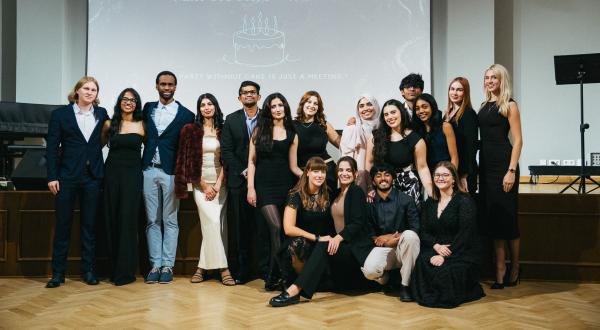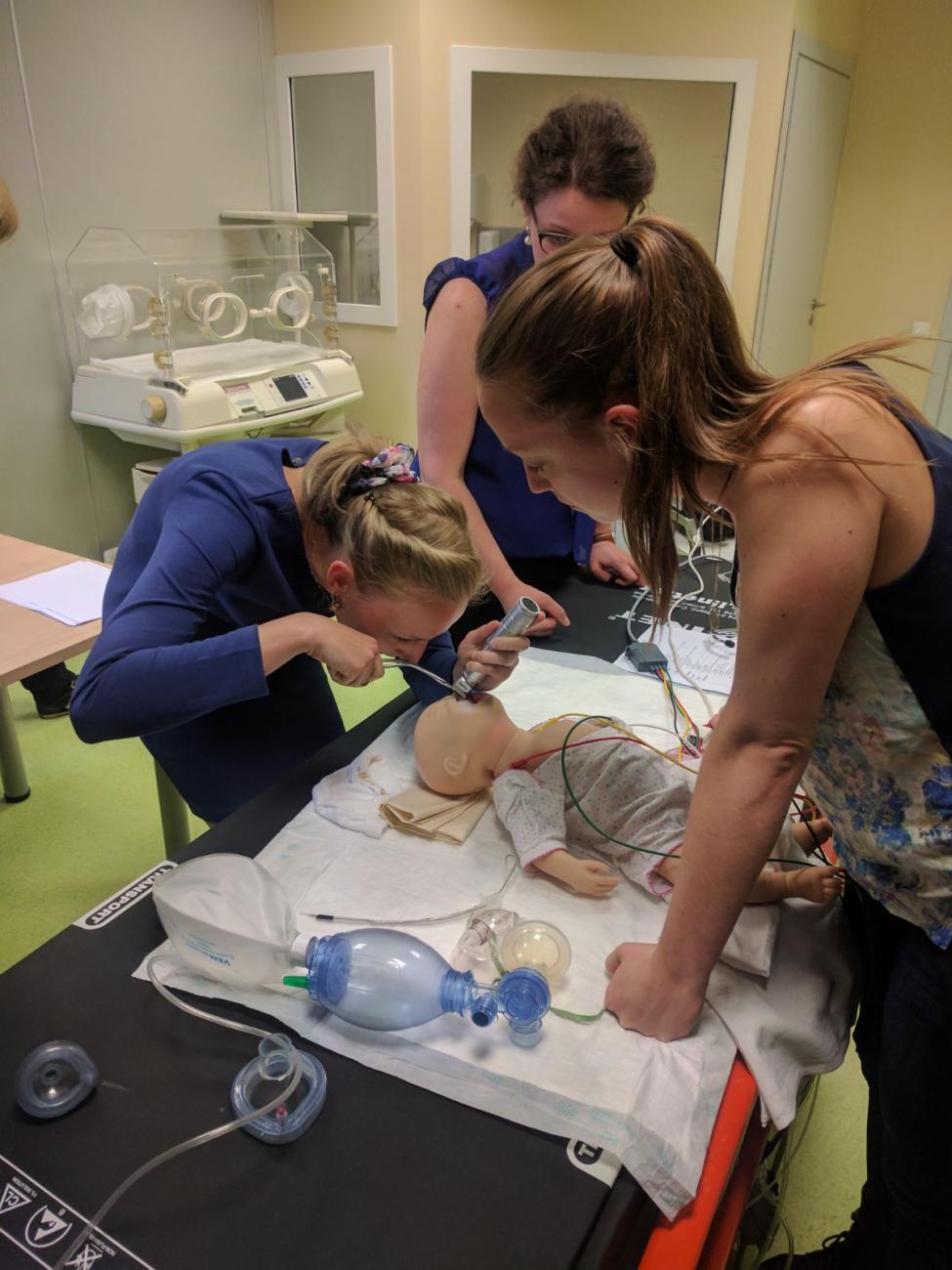In search of most effective paediatric treatment algorithms through simulation-based telelearning
At some point, every one of us must have admired the inspirational characters on medical drama TV shows – compassionate, sharp-minded, highly intuitive and always successful in solving the most complex and hopeless cases. Medical skills are not hereditary but acquired as the result of hard studies and thorough training. Riga Stradiņš University (RSU) in collaboration with U.S. top medical schools – Yale University and Washington University – have launched work on the developing of an algorithm to enable more effective and efficient training and assessment of prospective paediatricians – medical residents in intensive care and emergency medicine through clinical case simulations and techniques, thereby opening new and previously undiscovered training opportunities.
Simulation – a dialogue and self-analysis
As explained by author of the project idea and lead partner, Assistant Professor at RSU and paediatrician at the Paediatric Intensive Care Unit at the Children’s Clinical University Hospital, R. Balmaks, “The main phase of simulation-based learning is debriefing. In our context, it is an educational tool implying self-analysis. Medical residents with certain experience in clinical work know the theoretical part; however require assistance with shaping their algorithms of conduct in the professional environment. It may be attained by asking structured questions, allowing themselves to arrive at the necessary answers through self-analysis and reflection”.
“The art of asking the right questions is acquired in collaboration with U.S. lecturers. Instead of describing the clinical case, they ask guiding questions. A question – answer panel is a more effective tool than a “didactic” outline of “the right” conduct. Lecturers ask inquiring questions in a non-critical manner as to what the medical practitioner felt and what he thought when facing the particular situation. What were the obstacles to making a decision or understanding some specific aspects,” he continued, emphasising that knowledge gained from books will not suffice for a rheumatologist, “analytical skills, situational awareness, an ability to bring together diverse aspects and build an effective team are of paramount significance; in fact - it is like putting together a jigsaw puzzle – arriving at a clear picture and gaining a complete understanding of the measures to be taken in the particular circumstances.”
Goal – to discover the most effective debriefing pattern
We are looking forward to undertaking joint research with paediatric critical care specialists from the Yale School of Medicine on improving simulation-based debriefing, by defining the most effective debriefing patterns. “This is something utterly new and not yet experienced at a transcontinental level,” R. Balmaks outlines the universal nature of the debriefing mechanism, “every simulation-based debriefing involves assessment of team work, situation analysis and risk assessment skills.” We would like to introduce simulation-based learning into each medical residency study course, engaging specialists of the respective area.
As noted by Isabel Gross, clinical fellow from the Yale School of Medicine involved in the project, “Medical simulation is an effective tool for training future medical practitioners, however it requires certain skills, knowledge and experience for the tool to be applied more effectively. Training courses for simulation instructors are rather expensive and due to geographical considerations, it would be rather complicated to organise such training in Latvia.” I. Gross is looking forward to visiting RSU this September, as the cooperation with the Yale School of Medicine will be set forth in the new study year, “We have received positive feedback from students, the training progress is enormous and we have managed to achieve this without physically crossing state borders and without paying huge simulation course participation fees!”
Dr. Goldsmith, a professor at Washington University School of Medicine, director and practicing paediatrician at St. Louis Children’s Hospital, Pediatric Critical Care Unit is another project participant. During implementation of the project he has visited Latvia several times, “In the last couple of years Reinis and I have participated in clinical webinar training sessions for paediatric residents. It was my first and truly unique experience. As for my observations, RSU medical residents are competent, enthusiastic and motivated. It is beyond question that the quality of medical education at RSU is high. Web-based seminars are an excellent opportunity for lecturers to overcome large distances, creating opportunities which I as a student did not have. I am looking forward to continuing this cooperation to streamline the programme in the future.”
Gains for students
The gains from the introduction of simulation-based learning have been highlighted also by RSU 2nd year paediatric resident Luīze Bidiņa, “The new simulation and analysis model makes residents think critically and analyse clinical cases on a different level to the previous one. Self-experienced and self-analysed cases, as a rule, are remembered better. Situations requiring immediate action, when there is no time to consult a senior, more experienced colleague are rarely faced, however one cannot exclude such a need and we have to be well-prepared for that. I see no better opportunity to prepare for such critical cases than simulation-based modelling in a safe environment where mistakes are allowed. Proper analysis of one's own and colleagues’ mistakes or actions makes for a more productive learning process. Currently while working at the Admissions Unit I feel that the training has left a positive impact upon my way of thinking, reaction time and approach towards patients.”
The future belongs to telemedicine
Intercontinental simulation-based medical training is effectuated via modern means of communication, e.g. Skype, and this is a general trend in modern medicine. R.Balmaks is convinced that, “The future belongs to telemedicine,” noting that there are numerous examples when doctors from US clinics have used live streaming through mobile phones for long-distance teleconsultations, e.g. on encephalography. “The number of encephalography specialists is limited and such professionals cannot be consulted at every hospital, therefore modern means of communication offer a good alternative. There are cases when Mexican hospitals organise web-based consultations with doctors from US clinics, thereby avoiding time-consuming flights from one location to another. Similar care is also practiced also e.g. in the United Kingdom for the treatment of severe burns in children. It is recommended to treat severe burn injuries at specialised burn care centres, which in most cases are established for adult patients. To treat younger patients most effectively, paediatricians commonly use virtual consultations with specialists working in adult centres”, he illustrated modern healthcare trends.
New approaches in RSU medical training
The contribution of R. Balmaks and his commitment to the introduction of new and contemporary study methods goes hand-in-hand with the RSU development plan. The implementation of a project of such scale requires teamwork, however initially it is based on the initiative of individual lecturers, where the contribution made by R. Balmaks should be particularly highlighted. Dean of the Faculty of Continuing Education, Professor Ilze Grope revealed, “The Faculty of Continuing Education, together with the Department of Paediatrics and the Medical Education Technology Centre have offered to pediatric residents to be the first to try the new learning tool. Why residents? It is necessary to understand that the given training model is an utterly new experience in Latvia and requires thorough previous preparation and teamwork. Members of the team require courage and confidence in their skills and a good command of English. One must be able to apply the acquired knowledge and skills in imitated stressful situations which is not an easy task, knowing that each movement and each word you say is recorded and afterwards analysed together with internationally recognised medical experts. Residents represent the part of the medical community that is full of initiative, they are willing and have the ability to accomplish things and are eagerly capturing global trends.”
Facts & figures
According to the World Health Organization, Latvia has one of the highest (3rd place) child mortality rates in the EU. Reduction of child mortality was among UN millennium development goals, which Latvia had committed to achieve. The global goal was not achieved by 2015 and now has been transformed into a UN sustainable development goal.
Related news
 13th anniversary of RSU’s International Student Association celebrates accomplishments and communityFor Students, News
13th anniversary of RSU’s International Student Association celebrates accomplishments and communityFor Students, News




